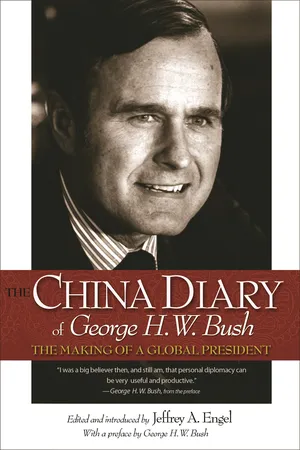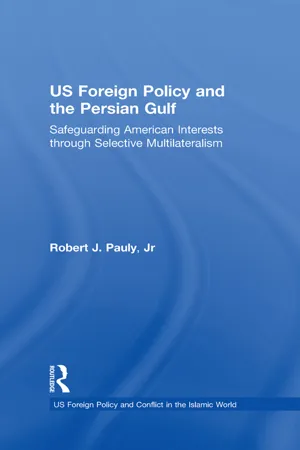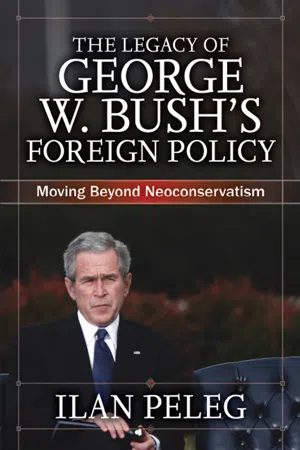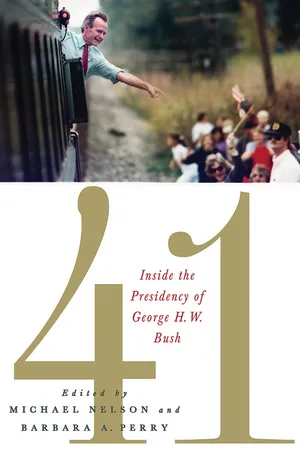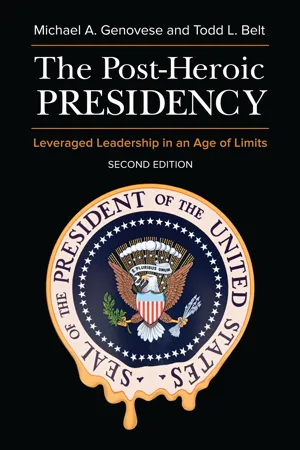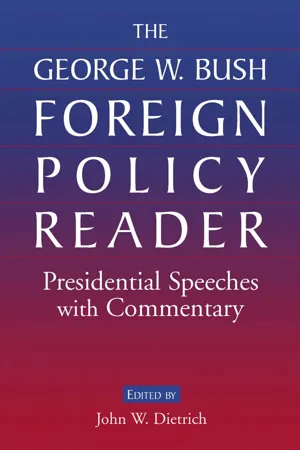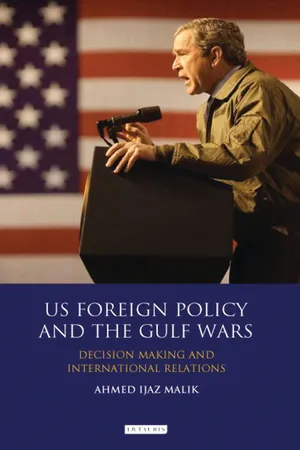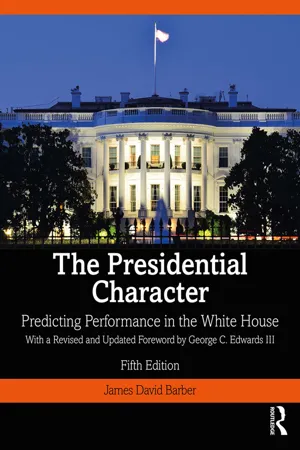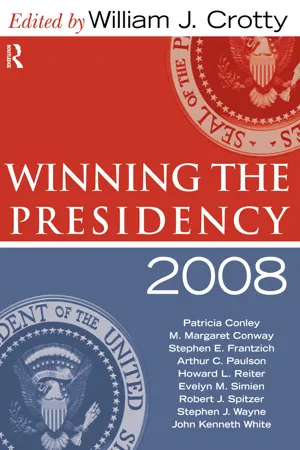History
George H. W. Bush Presidency
George H. W. Bush served as the 41st President of the United States from 1989 to 1993. His presidency was marked by foreign policy successes, including the end of the Cold War and the Gulf War. Domestically, he faced economic challenges and ultimately lost his bid for re-election to Bill Clinton in 1992.
Written by Perlego with AI-assistance
Related key terms
9 Key excerpts on "George H. W. Bush Presidency"
- eBook - ePub
The China Diary of George H. W. Bush
The Making of a Global President
- Jeffrey A. Engel, Jeffrey A. Engel, Jeffrey Engel(Authors)
- 2011(Publication Date)
- Princeton University Press(Publisher)
BUSH IN CHINAThe Making of a Global President
I nterest in George H. W. Bush’s presidency has grown in direct proportion to the violence and instability of the twenty-first century’s first decade. Many recall with fondness the end of the Cold War and Bush’s White House tenure, conjuring halcyon (if not necessarily accurate) memories of a more optimistic moment for the international community, when American-led peace and democracy seemed ready to flower throughout the world. Fascination with Bush’s legacy—in effect, a desire to glean from his presidency applicable contemporary lessons—grows steadily. His diplomatic record is widely lauded, with successful navigation of the Cold War’s end, Germany’s reunification, victory in Panama and the Gulf, and negotiation of the North American Free Trade Agreement heading his administration’s list of achievements.Yet George H. W. Bush himself largely remains an enigma, as the implications of those achievements remain in dispute. A generation after he left office, Bush’s diplomatic reputation offers less a collection of guiding principles than a canvas upon which contemporary commentators paint their own preferred outlines of a successful foreign policy. To some, Bush has become a sage embodiment of a more pragmatic American foreign policy; to others, the poster child for policies built on narrow interests rather than universal ideals. Depending on which particular axe the speaker chooses to grind, Bush was a reaper of geopolitical good fortune or a sower of international discontent.Timing explains much of this confusion. Juxtaposed in history’s stream against the eloquent certitude of Ronald Reagan, the intellectual flexibility of Bill Clinton, and the unbridled certainty of George W. Bush, the elder Bush, known for his prudence (itself a malleable virtue), remains largely ill defined as an international strategist. This is a particularly unfortunate puzzle, because decisions made by Bush’s White House not only were historic in their own right but also left a lasting imprint on the central strategic questions of the twenty-first century, including the inherent tensions between political stability and economic modernization, and the promise of a democratic peace alongside the potential chaos of ethnic and religious strife catalyzed by popular rule. A generation later, not even the flashpoints of American foreign policy have changed: they remain Iraq, China, Russia, free trade, and oil. The questions that troubled Bush during that more optimistic time continue to plague American policymakers today. - eBook - ePub
US Foreign Policy and the Persian Gulf
Safeguarding American Interests through Selective Multilateralism
- Robert J. Pauly, Jr(Authors)
- 2017(Publication Date)
- Routledge(Publisher)
Chapter 3 George H.W. Bush Administration and the Persian Gulf, 1989–1993Introduction
With respect to the conduct of foreign policy, all American presidential administrations must manage transitions upon assuming office. The challenges of such transitions are typically conditioned by changes that reflect the political affiliations and worldviews of a given president and his advisors, and the degrees of continuity and change prevalent in the international system at a particular temporal juncture. Over the course of the Cold War, most of those challenges were similar in character in that they grew out of the confrontation pitting the United States against the Soviet Union. Between 1945 and 1988, for example, those two states’ relative power fluctuated regularly, but the bipolar structure of the global system remained relatively unchanged. When George H.W. Bush began his tenure as president in January 1989, however, the system itself was on the brink of a fundamental change. The geopolitical transformation that ensued was the result of the collapse of Moscow’s communist empire and the implosion of the Soviet Union itself between 1989 and 1991. Those developments, in turn, left the United States as the world’s lone superpower.For its part, the Bush administration had both to preside over what proved to be the proverbial final act of the Cold War in the heart of Europe and, concomitantly, to plan and prosecute America’s first major “hot” conflict in the strategically vital Persian Gulf. The former demanded the diplomatic orchestration of Moscow’s surrender of political influence on the European continent in 1989–90. The latter entailed the construction of a coalition of states (including the Soviet Union) to oppose Iraqi President Saddam Hussein’s invasion and occupation of neighboring Kuwait in 1990 and then support the subsequent expulsion of Baghdad’s forces through the prosecution of the Persian Gulf War in 1991.Those two sets of events were directly related. Ultimately, the manner in which Bush oversaw the conclusion of the Cold War through the collapse of communist regimes across Central and Eastern Europe in the fall and winter of 1989–90 and the unification of Germany in October 1990 set the stage for his administration’s management of the Persian Gulf Crisis for two reasons.1 - eBook - ePub
The Legacy of George W. Bush's Foreign Policy
Moving beyond Neoconservatism
- Ilan Peleg(Author)
- 2018(Publication Date)
- Routledge(Publisher)
Bush became president at the time that the United States was the recognizable global hyperpower, easily the single most dominant country in the world. While the United States had to deal with an increasingly diverse, polyarchic world, 7 its dominance has provided it with an opportunity to guide the world toward new horizons. That dominance put the man in the White House in a unique position of influence. Third, the fact that September 11 constituted in the minds of most professional observers, and the public at large, a new, ambiguous, and unusually complex situation in which the United States was challenged by a nonstate representing an ill-defined ideology and unspecified demands allowed the White House, more than any other American institution (such as Congress), to define the situation and implement a solution. More than any other event in memory, 9/11 threw the ball into the president’s court: it was an event that gave the president of the United States as much power as any leader ever had in reshaping the world. Those three factors, in combination, facilitated the Bush revolution in foreign policy. But the specific shape that this revolution took was determined by the personality of the president, the interactions that he had with his closest advisers, the decision-making process that he created within his administration, and the ideological messages that he chose to absorb, adopt, and implement. It is to the president’s personality that we now turn. C LASSIFYING B USH George W. Bush has become one of America’s most controversial presidents ever. He is now in a league with Richard Nixon. Writes Noonan: “Americans don’t really know, deep in their heads, whether this president, in his post-9/11 decisions, is a great man or a catastrophe, a visionary or wholly out of his depth.” 8 In order to take the measure of Bush we need to look deeper into the type of leadership he provided during his time in office - eBook - ePub
Miller Center of Public Affairs Books
Inside the Presidency of George H. W. Bush
- Michael Nelson, Barbara A. Perry, Michael Nelson, Barbara A. Perry(Authors)
- 2014(Publication Date)
- Cornell University Press(Publisher)
There is in the popular memory no prominent and durable achievement that serves to anchor Bush in the public mind. The success of the first Gulf War faded in retrospect because it was a fast-won venture in a country few Americans knew and because Saddam Hussein’s survival to fight another day became a persistent reminder of unfinished business. Bush’s success in bringing the Cold War to a peaceful and satisfactory conclusion did not permanently elevate his public stature because his diplomacy was quiet, modest, and often indirect and because Ronald Reagan already occupied that particular pedestal. And Bush’s major domestic victories were either in areas more closely associated with the life’s work of others (such as Senators Edward Kennedy and Tom Harkin and the Americans with Disabilities Act) or created such polarizing political effects (such as the 1990 budget accord and Clarence Thomas’s Supreme Court appointment, which is described in chapter 7 by Barbara A. Perry and Henry J. Abraham) that even today they constitute an indefinite public legacy. 17 Moreover, as both Michael Nelson (chapter 1) and Hugh Heclo (chapter 2) explain, Bush’s uneven relationship with an evolving Republican Party left him at the end of his career without the kind of cohesive core constituency—“Bush Republicans”—to which a firm historical identity might be secured. If the popular judgment about George H. W. Bush has been subject to wide swings, the overall scholarly assessments of his presidency to date have been practically inert. The best place to see this is in Bush’s positioning in the historical rankings of presidents, those surveys of scholars occasionally compiled to arrange administrations from best to worst. The flaws in these rankings are often noted, but they do provide a rough picture of how historians and political scientists evaluate each president at a given moment - eBook - ePub
The Post-Heroic Presidency
Leveraged Leadership in an Age of Limits
- Michael A. Genovese, Todd L. Belt(Authors)
- 2016(Publication Date)
- Praeger(Publisher)
6 that failed to provide clear direction to his staff on the machinery of government. How could someone with so much governmental experience, with such an impressive resume, be so devoid of ideas, have so few clear policy preferences? Although Bush did have the most impressive resume in politics, it is equally true that he left few footprints along the way. George H. W. Bush was a manager, not a leader. He executed other people’s ideas, not his own. Upon election there were precious few ideas George H. W. Bush was determined to translate into policy. His was not an idea-driven administration. President Bush wanted to better manage the status quo. But the status quo was changing.Bush was pulled in a tug-of-war between his temperament, which sought stability and continuity, and the demands of the times, which called for dramatic change. The Bush leadership style—cautious, prudent, managerial—was a poor fit for times that begged for vision. The procedural presidency of George H. W. Bush turned out to be process centered, not idea driven. The times called out for leadership; Bush supplied prudence. As events moved rapidly, Bush moved slowly. Bush liked to play the “insider game” (he has been referred to as the “Rolodex president”), not the grand strategy game. He was always late, therefore, in his response to international events. This gave the United States little input as events unfolded. Soon, other powers sensed that they no longer needed to defer to the United States: Germany unified and the United States watched, China repressed dissidents and the United States issued a mild reproach, Eastern Europe exploded and the United States was a spectator. The United States was becoming less of an influential player in the game of international politics. It was less feared and less respected.George H. W. Bush’s style of leadership was often criticized as being “more reactive than proactive; more adrift than imaginative.”7 His was “the Revlon presidency,” because of his practice of offering only cosmetic solutions to problems.8 U.S. News & World Report called Bush’s first year “The Year of Living Timorously.”9 It could just have easily described his entire presidency.George H. W. Bush’s team was a fairly small, close-knit group of long-time acquaintances, all highly professional. Bush preferred to work with a few key, close advisers—Secretary of State James Baker, National Security Adviser Brent Scowcroft, Secretary of Defense Dick Cheney, and Chairman of the Joint Chiefs of Staff General Colin Powell—all of whom were strong in foreign affairs but less interested in domestic policy. Their driving theme seemed to be, in Bert Rockman’s words, “to do nothing well.”10 - eBook - ePub
The George W. Bush Foreign Policy Reader:
Presidential Speeches with Commentary
- John W. Dietrich(Author)
- 2015(Publication Date)
- Routledge(Publisher)
Chapter 1Bush and the World of 2000
For many generations of Americans, there has been one major event that has served as a defining moment in national or world affairs. The attack on Pearl Harbor turned December 7 into a date that would “live in infamy.” The assassination of President John F. Kennedy riveted the country. The terrorist attacks of September 11, 2001 (9/11) are this generation’s defining event. The images and emotions of that day are seared into the memories of hundreds of millions of people around the world. Since then, Americans have seen dramatic changes in their daily lives, political views, and perceptions of personal and national security.The events of 9/11 had a particularly powerful effect on the foreign policy of President George W. Bush and his administration. September 11 forced Bush to turn more attention to foreign policy, reinforced his conviction that the country needed strong presidential leadership, and gave him a sense of mission. The attacks also changed Bush’s policy priorities. New challenges, such as building an antiterrorism coalition and overthrowing regimes in Afghanistan and Iraq came to the fore, while other issues were lowered on the agenda. In addition, the war on terrorism has redefined who is a U.S. ally and who is an enemy. On a deeper level, 9/11 challenged the continued relevance of the long-standing strategic doctrines of containment and deterrence. Domestically, influence shifted away from Congress toward the executive branch. And among the President’s advisers, power shifted toward those favoring strong responses.Bush’s foreign policy, therefore, can be divided into two periods. The first period began when presidential candidate Bush laid out his vision of the world and it continued through his first eight months in office. The second period began with the events of 9/11 and continued through the rest of the first Bush administration. Although useful, this division should not be over-read as implying that Bush was completely reborn on 9/11, with no preexisting policy challenges or personal views. Focusing only on the second period would leave the observer with little sense of what Bush’s policies might have been in the absence of 9/11. Bush’s specific actions in response to the attacks would also be harder to understand. Most important, ignoring the first period would make it impossible to judge whether Bush’s longer-term bold, and by some accounts revolutionary, post-9/11 policies are entirely a function of 9/11, or whether those events simply reinforced and refocused his preexisting views on America’s national security and world role. Some background knowledge about Bush’s personal foreign policy experience, his decision-making style, the major policies he planned for his administration, his overall foreign policy vision, and the people he appointed as key advisers is, therefore, crucial to understanding Bush’s foreign policy both before and after 9/11. - eBook - ePub
US Foreign Policy and the Gulf Wars
Decision-making and International Relations
- Ahmed Ijaz Malik(Author)
- 2014(Publication Date)
- I.B. Tauris(Publisher)
3
PRESIDENT G.H.W. BUSH’S ADMINISTRATION AND THE 1991 GULF WAR
Consistencies of interests, objectives and policies: US’s evolving Cold War and post-Cold War global strategyIn this chapter, I trace the continuity of the foreign policy trends and official discourses from the Cold War years and relate them to the 1991 Gulf War by analyzing the official documents and speeches during the presidency of G.H.W. Bush, after Iraq’s invasion of Kuwait, and comparing them with the policies during the Gulf crisis, conduct of war and approach towards Iraq after the war. Continuing from the argument in Chapter 2, I also highlight that, although neoconservatives had gradually gained prominence during the Reagan era, the realist approach of G.H.W. Bush’s administration distanced neoconservatives from policy and decision-making. However, I also relate the gradual resurgence of neoconservatism after the decisive victory of the US and its allies in the 1991 Gulf War.In order to analyze US evolving foreign policy objectives during the Cold War years, I focus on the arguments of two scholar-practitioners who served as National Strategy Advisors and worked for two different administrations and so played a significant role in the rise of the US as a global power during the Cold War years. Zbigniew Brzezinski is a Polish-American political scientist and geostrategist who, at the time of writing, is Robert E. Osgood Professor of American Foreign Policy at Johns Hopkins University’s School of Advanced International Studies. He served as National Security Advisor for Democratic president J.E. Carter. Brent Scowcroft is the founder and president of a Washington based think-tank, Forum for International Policy, and, at the time of writing, is also a member of the Council on Foreign Relations and the Center for Strategic and International Studies. He also served as National Security Advisor for Republican presidents G.R. Ford and G.H.W. Bush. Brzezinski and Scowcroft share similar worldviews, despite serving two different administrations formed by two different political parties. In order to trace the relevance of their arguments, I elaborate their views on the Cold War, post-Cold War and post-9/11 foreign policy of the US, with special reference to the 1991 and 2003 Gulf Wars. The continuity of the patterns in US foreign policy and their agreement on the US policies vis-à-vis the USSR, Europe, the Middle East and Iraq, and on the issues of nuclear proliferation, can be observed in a recent series of debates and discussions between them.1 Regarding the US’s post-9/11 grand strategy, both emphasized the primacy of US national interests. Both had been significantly influenced by the superpower confrontations and nuclearization during the Cold War years, hence they had a strong fear of a nuclear holocaust. Therefore, both agreed that US strategic policy should be directed towards preventing and eliminating nuclear threats. In terms of US policy towards Iraq, both agreed that President G.H.W. Bush’s strategy during the 1991 Gulf War had been rational and directed towards the attainment and preservation of the US’s vital interests; however, they also agreed that, in the post-9/11 context, the US should neither have attacked Iraq nor invaded it, since there had been no credible evidence that Iraq posed a strategic nuclear threat. Both agreed that at the time when the decision was taken to invade the Gulf in 2003, trying to build a connection between Al Qaeda and Saddam Hussein was illogical because one was a religious extremist organization and the other a secular regime. Regarding US post-Gulf War (2003) strategy, they argue that deploying the US army in Iraq would be a grave miscalculation, because the army would be bogged down in a long-term conflict2 and therefore raising the costs of conflict tremendously. Regarding the situation in Iraq at the time of writing, they disagree slightly on the timeframe of the withdrawal of US troops from Iraq. Brzezinski advocates a terminal date of exit and an early withdrawal,3 while Scowcroft argues for a slow and systematic withdrawal.4 - eBook - ePub
The Presidential Character
Predicting Performance in the White House, With a Revised and Updated Foreword by George C. Edwards III
- James Barber(Author)
- 2019(Publication Date)
- Routledge(Publisher)
But then the election ended and the national amnesia process began. In tune with the climate of expectations, cycling on after the combative election, Bush the conciliator emerged, wrapping his arms around those he had just been stabbing in the back. The season of political despair, disillusionment and degradation was passed away and faith, hope and charity came on. A new era.Mr. Bush's Presidential style was defined in his first independent political success in Texas in 1962, when as local party chairman he defused a conflict between the John Birch Society and establishment Republicans. Bush the negotiator took that on as his main talent, and so it remains.His rhetoric is coachable as the '88 campaign brought out. He speaks about as well as Gerry Ford. His homework falls short of B-plus, as demonstrated by his lack of knowledge about such heavy issues as abortion and defense. When it comes to curiosity about reality, George Bush is no Jack Kennedy, no Harry Truman. He inherits from Mr. Reagan a practical prejudice for the rich masked by "conservatism," and a readiness to manipulate the media.Why expect from President Bush anything other than a continuation of the Reagan mythological politics?A close look at Mr. Bush's world view and character in the context of the situation he confronts makes plausible a different pattern. Although Mr. Bush, sounding like Herbert Hoover, urges us to believe that all is going well, the truth is that it is not. The evidence is at last coming through that there is trouble in River City—big, deep, harsh trouble that seems about to drop upon us.One need only speak aloud certain words to recall what is happening: drugs, deficit, nuclear weapons, disease, economic domination, foreign ownership, weakened education, dollar decline, third world debt, terrorism, slipping technology, children in poverty, refugees, environmental deterioration, guns for sale, human rights violations, civil wars.The worst political danger is interdependence plus anarchy. To suppose that these global cancers will simply waft away if we just dream on is folly, and folly competes with conspiracy as the worst of political solutions.We need to get peace and justice organized—institutionalized—internationally. Not just a flaky summit meeting now and then, or some little bilateral agreements. Turning around our international decline is going to take major new initiatives, large-scale and long-term, backed by the public. How might a President Bush make that happen? How might he destroy the chance? - eBook - ePub
- William J. Crotty(Author)
- 2015(Publication Date)
- Routledge(Publisher)
The Bush Presidency and the 2008 Presidential Election Context and Imprint WILLIAM J. CROTTYWe need to be able to read the page before we turn it.—SENATOR PATRICK J. LEAHY calling for a truth commission to investigate the Bush administrationThis chapter focuses on the factors leading up to the 2008 presidential election, those that combined to set the environment in which the presidential race would be fought. It serves as an introduction to the analyses to come in each of the following chapters and provides an overview and context for understanding the 2008 presidential race.The Bush-Cheney Presidency: Setting an Agenda for the 2008 Race
The actions and policies of the Bush administration established, directly and indirectly, the agenda for the presidential campaign. The accomplishments, failures, and ambitions of the Bush administration were the baseline from which all else flowed. Given the controversial and historically pathbreaking actions of the administration in a number of areas, it constituted a level of significance that is difficult to summarize. The issues generated by the Bush-Cheney years raised questions about the nation’s constitutional design as well as the wars in progress, the relevance of established legal procedures, and, most markedly for the 2008 race, an economy in deep trouble. How such concerns were to be addressed and their impact on the presidential contest and its outcome are questions at the heart of the 2008 presidential contest.With this as prelude we turn to a discussion of governance—policy, administration, and law during the Bush-Cheney years. The canvas is exceptionally broad—academicians, legal analysts, foreign and domestic policy experts, and the courts will be debating and dealing with the issues raised as well as their budgetary and social consequences and America’s relations with the international community for decades and generations to come. The Bush presidency was in a very real sense a transitional presidency, one that set an agenda for the 2008 campaign and one the incoming Obama administration must address in its many multilayered facets.
Index pages curate the most relevant extracts from our library of academic textbooks. They’ve been created using an in-house natural language model (NLM), each adding context and meaning to key research topics.
